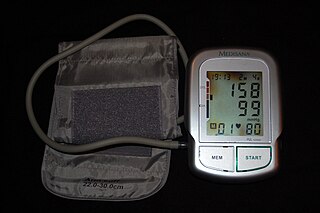
Angiotensin-converting-enzyme inhibitors are a class of medication used primarily for the treatment of high blood pressure and heart failure. This class of medicine works by causing relaxation of blood vessels as well as a decrease in blood volume, which leads to lower blood pressure and decreased oxygen demand from the heart.
Antihypertensives are a class of drugs that are used to treat hypertension. Antihypertensive therapy seeks to prevent the complications of high blood pressure, such as stroke, heart failure, kidney failure and myocardial infarction. Evidence suggests that a reduction of blood pressure by 5 mmHg can decrease the risk of stroke by 34% and of ischaemic heart disease by 21%. It can reduce the likelihood of dementia, heart failure, and mortality from cardiovascular disease. There are many classes of antihypertensives, which lower blood pressure by different means. Among the most important and most widely used medications are thiazide diuretics, calcium channel blockers, angiotensin-converting enzyme inhibitors, angiotensin II receptor blockers or antagonists (ARBs), and beta blockers.

Angiotensin-converting enzyme, or ACE, is a central component of the renin–angiotensin system (RAS), which controls blood pressure by regulating the volume of fluids in the body. It converts the hormone angiotensin I to the active vasoconstrictor angiotensin II. Therefore, ACE indirectly increases blood pressure by causing blood vessels to constrict. ACE inhibitors are widely used as pharmaceutical drugs for treatment of cardiovascular diseases.

Amlodipine, sold under the brand name Norvasc among others, is a calcium channel blocker medication used to treat high blood pressure, coronary artery disease (CAD) and variant angina. It is taken orally.

Enalapril, sold under the brand name Vasotec among others, is an ACE inhibitor medication used to treat high blood pressure, diabetic kidney disease, and heart failure. For heart failure, it is generally used with a diuretic, such as furosemide. It is given by mouth or by injection into a vein. Onset of effects are typically within an hour when taken by mouth and last for up to a day.

Indapamide is a thiazide-like diuretic drug used in the treatment of hypertension, as well as decompensated heart failure. Combination preparations with perindopril are available. The thiazide-like diuretics reduce risk of major cardiovascular events and heart failure in hypertensive patients compared with hydrochlorothiazide with a comparable incidence of adverse events. Both thiazide diuretics and thiazide-like diuretics are effective in reducing risk of stroke. Both drug classes appear to have comparable rates of adverse effects as other antihypertensives such as angiotensin II receptor blockers and dihydropyridine calcium channel blockers and lesser prevalence of side-effects when compared to ACE-inhibitors and non-dihydropyridine calcium channel blockers.

Angiotensin II receptor blockers (ARBs), formally angiotensin II receptor type 1 (AT1) antagonists, also known as angiotensin receptor blockers, angiotensin II receptor antagonists, or AT1 receptor antagonists, are a group of pharmaceuticals that bind to and inhibit the angiotensin II receptor type 1 (AT1) and thereby block the arteriolar contraction and sodium retention effects of renin–angiotensin system.

Isosorbide dinitrate is a medication used for heart failure, esophageal spasms, and to treat and prevent chest pain from not enough blood flow to the heart. It has been found to be particularly useful in heart failure due to systolic dysfunction together with hydralazine. It is taken by mouth or under the tongue.

Methyldopa, also known as α-methyl-L-DOPA and sold under the brand name Aldomet among others, is a medication used for high blood pressure. It is one of the preferred treatments for high blood pressure in pregnancy. For other types of high blood pressure including very high blood pressure resulting in symptoms other medications are typically preferred. It can be given by mouth or injection into a vein. Onset of effects is around 5 hours and they last about a day.

Amiloride, sold under the trade name Midamor among others, is a medication typically used with other medications to treat high blood pressure or swelling due to heart failure or cirrhosis of the liver. Amiloride is classified as a potassium-sparing diuretic. Amiloride is often used together with another diuretic, such as a thiazide or loop diuretic. It is taken by mouth. Onset of action is about two hours and it lasts for about a day.

Lisinopril is a medication belonging to the drug class of angiotensin-converting enzyme (ACE) inhibitors and is used to treat hypertension, heart failure, and heart attacks. For high blood pressure it is usually a first-line treatment. It is also used to prevent kidney problems in people with diabetes mellitus. Lisinopril is taken orally. Full effect may take up to four weeks to occur.

Benazepril, sold under the brand name Lotensin among others, is a medication used to treat high blood pressure, heart failure, and diabetic kidney disease. It is a reasonable initial treatment for high blood pressure. It is taken by mouth. Versions are available as the combinations benazepril/hydrochlorothiazide and benazepril/amlodipine.

Losartan, sold under the brand name Cozaar among others, is a medication used to treat high blood pressure (hypertension). It is in the angiotensin receptor blocker (ARB) family of medication, and is considered protective of the kidneys. Besides hypertension, it is also used in diabetic kidney disease, heart failure, and left ventricular enlargement. It comes as a tablet that is taken by mouth. It may be used alone or in addition to other blood pressure medication. Up to six weeks may be required for the full effects to occur.

Valsartan, sold under the brand name Diovan among others, is a medication used to treat high blood pressure, heart failure, and diabetic kidney disease. It belongs to a class of medications referred to as angiotensin II receptor blockers (ARBs). It is a reasonable initial treatment for high blood pressure. It is taken by mouth.

Amlodipine/benazepril, sold under the brand name Lotrel among others, is a fixed-dose combination medication used to treat high blood pressure. It is a combination of amlodipine, as the besilate, a calcium channel blocker, and benazepril, an angiotensin converting enzyme inhibitor. It may be used if a single agent is not sufficient. It is taken by mouth.

Perindopril is a medication used to treat high blood pressure, heart failure, or stable coronary artery disease. As a long-acting ACE inhibitor, it works by relaxing blood vessels and decreasing blood volume. As a prodrug, perindopril is hydrolyzed in the liver to its active metabolite, perindoprilat. It was patented in 1980 and approved for medical use in 1988.

Aliskiren is the first in a class of drugs called direct renin inhibitors. It is used for essential (primary) hypertension. While used for high blood pressure, other better studied medications are typically recommended due to concerns of higher side effects and less evidence of benefit.
Telmisartan/amlodipine, sold under the brand name Twynsta among others, is a fixed-dose combination medication used to treat high blood pressure. It is a combination of telmisartan, an angiotensin II receptor antagonist, and amlodipine, as the besilate, a calcium channel blocker. It is taken by mouth.

The Antihypertensive and Lipid Lowering Treatment to Prevent Heart Attack Trial, also known as ALLHAT, was a randomized, double-blind, active-controlled study comparing at the same time, four different classes of antihypertensive drugs with the rate of coronary heart disease (CHD) events in ‘high-risk’ people with hypertension. Participants were initially randomised to chlorthalidone (diuretic) versus doxazosin, lisinopril (ACE-inhibitor), and amlodipine.















